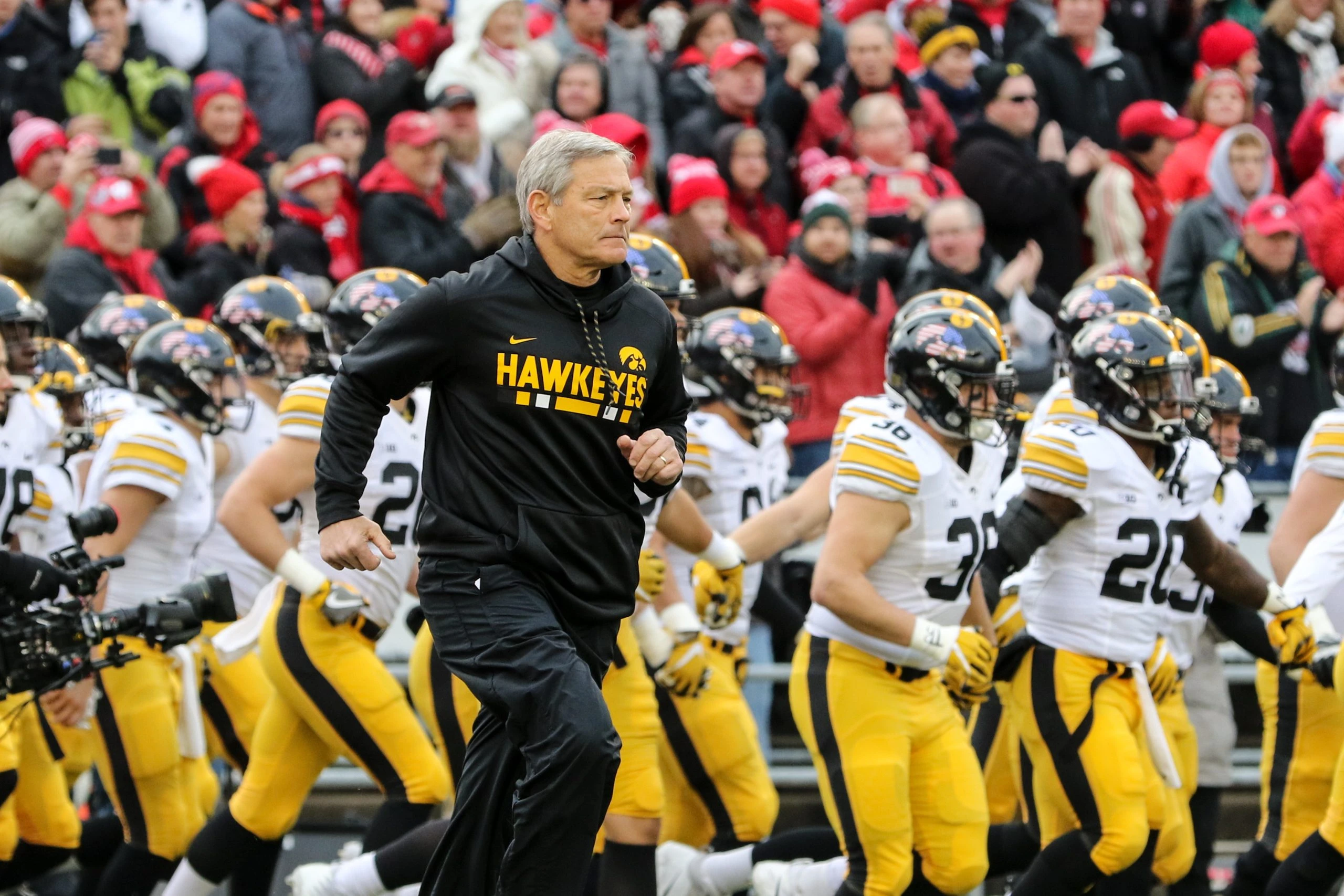It’s been a year in the making; my All-Kirk Ferentz team
By Pat Harty
IOWA CITY, Iowa – Last June, I was planning to unveil my All-Kirk Ferentz team at Iowa, but that changed when multiple former Iowa black players accused the program of racial disparities.
The timing just wasn’t right to recognize and honor greatness in the midst of a disturbing controversy.
So I put it off for a year as Iowa worked to fix its culture under Ferentz.
And with that work now showing progress and continuing on a daily basis, this seems a more appropriate time to unveil my All-Kirk Ferentz team, which has had two changes since last June when I first picked the team.
I’ll give you a hint: one of the changes came on offense, while the other came on defense. I also considered making a change on special teams.
The team consists of 22 position players, along with a kicker, punter and return specialist, so 25 players overall.
I thought about picking just the best players from each unit because some positions, most notably offensive tackle, defensive end, middle linebacker and cornerback, are loaded with worthy candidates. Some of the offensive tackles who didn’t make the team include Tristan Wirfs, Bryan Bulaga and Riley Reiff.
I also thought about picking two running backs and not recognizing the fullback position. But that would be unfair and inaccurate because the fullback position has played a key role under Kirk Ferentz despite having little to show from a statistical standpoint.
So it came down to choosing between Ladell Betts and Shonn Greene at running back. And needless to say, it wasn’t easy.
The process of trimming the list of candidates to 11 on offense and 11 on defense was fun at times, maddening at times and hopeless at times. It came down to making some incredibly hard choices, especially at offensive tackle, defensive end and middle linebacker, and with two of the four defensive backs.
There is no right or wrong answers when picking the All-Kirk Ferentz team because the process is all subjective.
The first thing I did was make the three obvious choices: Bob Sanders at strong safety, Marvin McNutt at receiver and Desmond King at cornerback.
Quarterback came down to body of work in the case of Drew Tate versus Brad Banks’ magical season in 2002 when he finished runner-up for the Heisman Trophy as a first-year starting senior.
Trying to settle on just two defensive ends was so difficult and frustrating that I almost gave up and picked three to go along with one defensive tackle.
But I ultimately settled on two defensive ends and two defensive tackles.
Tight end was another maddening experience trying to choose between Dallas Clark and T.J. Hockenson because a strong case could be made for both of them.
However, Tony Moeaki might be the most complete tight end to have played under Kirk Ferentz. Unfortunately, injuries kept Moeaki from being considered for the top spot.
George Kittle is also the most accomplished of all the tight ends under Kirk Ferentz if you include his ascent to stardom in the NFL. But these picks were based solely on what each player accomplished as a Hawkeye and Kittle never made All-Big Ten and was hampered by injuries.
Some also might wonder why offensive lineman Marshal Yanda didn’t make the team, but he never made first-team All-Big Ten at Iowa and he only played for two seasons. Yanda, just like with Kittle, became a star in the NFL.
The pick at quarterback, the cornerback position opposite Desmond King and punter also came down to a body of work versus one incredible season.
Middle linebacker, on the other hand, came down to one sensational body of work versus another sensational body of work.
The fact that Kirk Ferentz is the longest tenured head coach in college football, and entering his 23rd season at Iowa, made picking this team a daunting task because there was so much territory to cover, and so many players to consider.
OFFENSE
WR – Marvin McNutt, 2008-11: This was a no-brainer with McNutt being the most statistically accomplished receiver in program history. The St. Louis native is Iowa’s all-time leading receiver with 2,861 career yards, and its single-season leader with 1,315 yards in 2011. McNutt also had 28 touchdown receptions as a Hawkeye.
WR – Derrell Johnson-Koulianos, 2007-10: He and McNutt are the only receivers in program history to have more than 2,500 receiving yards. Johnson-Koulianos actually had three more career receptions than McNutt (173) and finished with 2,616 receiving yards and 17 touchdowns.
Johnson-Koulianos’ career ended in shame and controversy as he was arrested on drug charges near the end of his senior season. But his performance on the field in four seasons as a starter speaks for itself.
TE – Dallas Clark, 2000-02: A former walk-on linebacker under Hayden Fry, he won the John Mackey Award as the nation’s top collegiate tight end as a junior in 2002, and was a key piece to a team that finished 11-2 overall and undefeated in the Big Ten.
Iowa’s success as a team is what ultimately gave Clark a slight edge over T.J. Hockenson, who won the John Mackey Award in 2018.
T – Robert Gallery, 2000-03: He came to Iowa in 1999 as a tight end and then left in 2003 as the winner of the Outland Trophy that goes to the nation’s top collegiate offensive lineman.
T – Brandon Scherff, 2011-14: The former high school quarterback from Denison won the Outland Trophy as a senior in 2014.
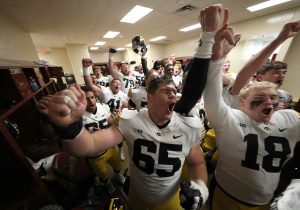
C – Tyler Linderbaum, 2019-present: The Solon native was recruited as a defensive tackle and played that position as a true freshman until switching to center during preparation for the 2018 Outback Bowl. To say the move has paid dividends for Iowa, and for Linderbaum, would be an understatement as he now ranks as arguably the top center in college football after having earned All-America accolades last season.
Bruce Nelson was my pick at center a year ago, but that was before Linderbaum ascended to greatness.
G – Sean Welsh, 2014-17: This spot came down to Welsh and Dace Richardson, both of whom made first-tam All-Big Ten as a senior. Welsh was given a slight edge because Richardson only played in four conference games as a senior in 2009 due to injury.
G – Eric Steinbach, 1999-02: Just like with Gallery, he also came to Iowa as a tight end before switching to the offensive line where he became a consensus All-American as a guard.
QB – Brad Banks, 2001-02: I shifted back and forth between Banks and Tate before finally picking Banks because his performance in 2002 was just so spectacular, something we might never see again. Banks went from being the backup quarterback in 2001 to the runner-up for the Heisman Trophy in 2002. He also led Iowa to its first undefeated record in the Big Ten (8-0) in 80 years.
Banks only played two seasons at Iowa, while Tate was a three-year starter and the Big Ten Offensive Player of the Year for Iowa’s 2004 Big Ten champion team.
A strong case could be for either one. But again, what Banks did as a dual-threat quarterback in his only season as a starter was the stuff of legends.
Iowa also combined to lose 12 games during Tate’s final two seasons as the starter.
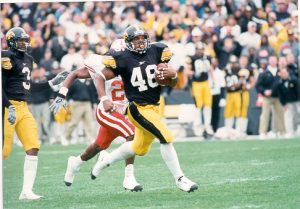
RB – Ladell Betts, 1998-01: Unlike at quarterback, I went with body of work over one incredible season at running back, giving Betts a slight advantage over Greene, who won the Doak Walker Award in 2008 as the nation’s top collegiate running back.
Greene truly was spectacular in 2008, rushing for 1,850 yards, which is the most in program history for a single season.
Betts, on the other hand, was a three-year starter under Kirk Ferentz and helped lay the foundation. Betts never rushed for more than 1,090 yards as a Hawkeyes. But he also ran behind undersized and inexperienced offensive lines for much of his career, and played on teams that finished 1-10 in 1999 and 3-9 in 2000.
Betts is Iowa’s second all-time leading rusher with 3,686 yards, and most of those yards came the hard way. He is also Iowa’s new running backs coach.
FB – Jeremy Allen, 1998-2001: This pick was easy as Allen did more than just block as Iowa’s starting fullback. He carried the ball 99 times for 438 yards and four touchdowns and caught 36 passes for 386 yards and four more scores. No other fullback comes close to matching those numbers.
Allen gained more than half of his rushing yards (242) in 2001 when Iowa had its breakthrough season under Kirk Ferentz, finishing 7-5 overall. He also caught 20 passes for 264 yards and four touchdowns in 2001.
DEFENSE
DE – Adrian Clayborn, 2007-10: The St. Louis native was a consensus All-American as a senior in 2010 and a three-year starter.
DE – Matt Roth, 2001-04: This spot came down to Roth and A.J. Epenesa and it took a while before finally picking Roth. Both players were disruptive forces coming off the edge, but Epenesa only started for one season, while Roth played extensively for four seasons and was a three-year starter.
Roth was a second-team All-American in 2004 and made first-team All-Big Ten in 2003 and 2004.
He also finished his career with 30 sacks, which is the most for a player under Kirk Ferentz.
Epenesa’s only flaw, or blemish is that he was part of a three-man rotation at defensive end as a freshman and sophomore and played the least among the three. If picking this team was based on loyalty and unselfishness, Epenesa would’ve been an easy selection.
DT – Mitch King, 2005-08: The Burlington native came to Iowa as a linebacker and left as the Big Ten Defensive Lineman of the Year in 2008. He was also named first-team All-American by ESPN.com as a senior in 2008 and made first-team All-Big Ten in 2007 and 2008.
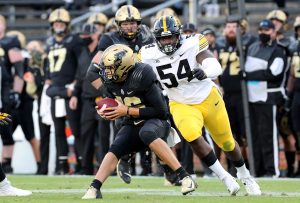
DT – Daviyon Nixon, 2019-20: He wasn’t even under consideration a year ago because he had only played as a reserve to that point. But what Nixon accomplished in just eight games this past season gave him the advantage over Colin Cole and Jonathon Babineaux.
Nixon was a consensus first-team All-America selection and the Big Ten Defensive Player of the Year in 2020.
WLB – Chad Greenway, 2002-05: The South Dakota native overcame a knee injury early in college to become one of the greatest linebackers in program history. He earned second-team All-America recognition as a junior and senior, and twice made first-team All-Big Ten and second-team once.
MLB – Josey Jewell, 2014-17: Choosing between Jewell and Abdul Hodge at middle linebacker was so hard, partly because Hodge is one of my favorite players from the Kirk Ferentz era. Hodge also made first-team All-Big Ten as a sophomore and junior, and second-team as a senior.
But as great as Hodge was as a Hawkeye, I couldn’t justify picking him over Jewell because Jewell was a unanimous consensus All-American as a senior in 2017, a three-year starter and team captain for multiple seasons.
LEO – Christian Kirksey, 2010-13: He never made first- or second-team All-Big Ten, but was a three-year starter and team captain. I thought about leaving Kirksey off the team in order to put Hodge on it, but ultimately decided to recognize all three linebacker positions.
It’s tough for linebackers at the Leo position to accumulate big statistics because they often play in space and spend a lot of time being matched against tight ends.
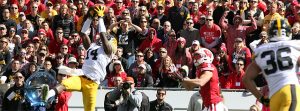
CB – Desmond King, 2013-16: The Detroit native was a starter almost from the moment he joined the team. He won the Jim Thorpe Award as the nation’s top defensive back as a junior in 2015 and also made first-team All-Big Ten as a senior in 2016.
CB – Micah Hyde, 2009-12: This spot came down to Hyde and Josh Jackson, and was another case of body of work versus one spectacular season. Body of work prevailed as Hyde was a three-year starter and was named the Big Ten Defensive Back of the Year in 2012.
Jackson, on the other hand, only started for one season in 2017, and played mostly on special teams before that season. However, Jackson was so productive as a starter in 2017, earning consensus All-America honors, that I seriously considered picking him over Hyde.
Jovon Johnson and Amari Spievey also were given consideration.
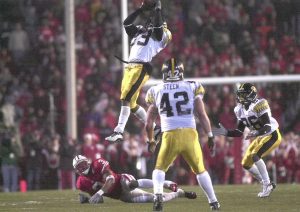
SS – Bob Sanders, 2000-03: No explanation is needed for this pick with Sanders being the most influential player during the Kirk Ferentz era. Sanders was a force on the field and one of the hardest hitters to ever wear an Iowa uniform. He made first-team All-Big Ten three times and helped change the tempo under Kirk Ferentz more than any other player.
Tyler Sash, who passed away in 2015, also deserves to be mentioned because he twice made first-team All-Big Ten as a strong safety and had a knack for making big plays.
But Sash was up against a Hawkeye legend and maybe the most popular player under Kirk Ferentz.
FS – Amani Hooker, 2016-18: He played both safety positions at Iowa, and played at an extremely high level. He was named the Big Ten Defensive Back of the Year as a junior in 2018.
Special teams
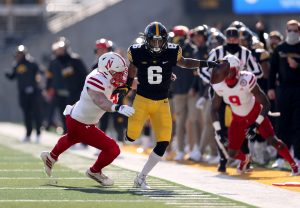
K – Nate Kaeding, 2000-03: The Iowa City West graduate won the Lou Groza Award as the nation’s top kicker in 2002, and was one of three finalists for the award in 2003. He was also a consensus All-American in 2003 and a key piece to the rebuilding process in the early years under Kirk Ferentz.
Keith Duncan was a consensus All-America kicker in 2019, but didn’t win the Lou Groza Award.
P – Ryan Donahue, 2007-10: I thought seriously about picking Tory Taylor since he was named the Big Ten Punter of the Year as a freshman last season. But I stuck with Donahue as a four-year starter who twice made second-team All-Big Ten.
RS – Ihmir Smith-Marsette, 2017-2020: This was another difficult choice between Smith-Marsette and Johnson-Koulianos. I picked Smith-Marsette, who was named the Big Ten Return Specialist of the Year as a sophomore in 2018, by the slightest of margins. Smith-Marsette returned two kicks for touchdowns in 2019, including one in the Holiday Bowl win over the University of Southern California.
